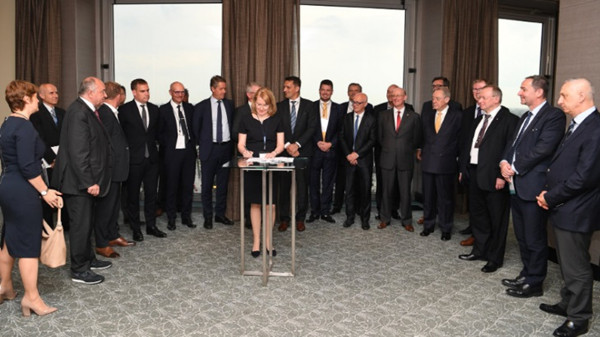Nuclear industry calls for teamwork in meeting EU climate targets
Representatives from the nuclear industry have today issued a manifesto outlining what steps need to be taken in order to achieve a decarbonised Europe by 2050. The target can be met, they say, but only if the European Union works in partnership with them.

The signing of the #NuclearEuropeLeaders manifesto in Bucharest (Image: Foratom)
The manifesto was announced at the Nuclear in a Changing World conference in Bucharest, Romania - a one-day event organised by European nuclear trade body Foratom. The aim of the conference was to discuss key challenges affecting the European Union's energy sector, the role of long-term operation of nuclear power plants and how to ensure that the industry has access to the skills it needs.
In late November, the European Commission adopted a strategic long-term vision for a "prosperous, modern, competitive and climate neutral economy" by 2050. The strategy - referred to as A Clean Planet for All - shows how Europe can lead the way to climate neutrality by investing into "realistic technological solutions, empowering citizens, and aligning action in key areas such as industrial policy, finance, or research", according to the Commission. This transition can be made, it suggests, "while ensuring social fairness". Each of the eight possible scenarios for the European Union includes a significant share of electricity generated by nuclear power.
In their joint manifesto, the nuclear industry representatives call upon EU policymakers to work with them to overcome the hurdles which have the potential to prevent Europe from achieving its goals.
"Meeting the EU's ambition to decarbonise its economy will require significant investment in all low-carbon technologies," their manifesto says. "This means investing in Europe in both the long-term operation of the existing fleet and the construction of substantial new nuclear capacity (around 100GW of nuclear new build). Both are achievable if EU institutions, Member States and the European nuclear industry work together in partnership."
The #NuclearEuropeLeaders manifesto says the nuclear industry will strive to deliver the required volume of nuclear capacity on time and at a competitive cost. It will also undertake research, development and innovation activities in Europe to identify areas where the nuclear industry can help decarbonise other sectors. The industry will contribute to ensuring security of energy supply, as well as continuing to manage used nuclear fuel and radioactive waste in a responsible manner. The nuclear industry will invest in and maintain human capital and will build a strong European foundation to export nuclear technologies and skills to overseas markets.
For its part, the manifesto recommends the EU agrees an ambitious net-zero carbon dioxide emissions target for Europe in 2050. It should also ensure a "coherent, consistent and stable" EU policy framework (including for Euratom), and implement an investment framework that incentivises investments in all competitive, low-carbon options. The EU should also support a stable low-carbon energy mix which can accommodate the increased share of renewable energy generation. It should also develop and implement a strong industrial strategy to ensure that Europe maintains its technological leadership and support human competences.
Representatives from the following companies and organisations signed the manifesto: Ansaldo Nucleare, CEA, CEZ Group, EDF, EDF Energy, EnergoAtom, Engie Electrabel, Fennovoima, Fortum, Framatome, Kozloduy NPP, MVM Group, Nuclear Industry Association, National Nuclear Laboratory, Nuclearelectrica, Orano, swissnuclear, Synatom, Tecnatom, TVO, Uniper Sweden, Urenco, Vattenfall and Westinghouse.
"We very much welcome this initiative taken by the CEOs and chief nuclear officers from the nuclear industry, particularly with the arrival of a new European Commission and European Parliament this year," said Foratom Director General Yves Desbazeille. "Achieving a carbon-free Europe by 2050 is a very ambitious target and it is important that we make the best use of all decarbonisation tools already available today. Nuclear energy is internationally recognised as a crucial asset in the fight against climate change and we, as an industry, stand ready to play our part."
The 128 nuclear power reactors (with a combined capacity of 119 GWe) operating in 14 of the 28 EU member states account for over one-quarter of the electricity generated in the whole of the EU. Nuclear accounts for 53% of the EU's carbon-free electricity.
The global nuclear industry has set the Harmony goal for nuclear energy to provide 25% of global electricity by 2050. This will require trebling nuclear generation from its present level. Some 1000 GWe of new nuclear generating capacity will need to be constructed by then to achieve that goal.
- China Institute of Atomic Energy
- Nuclear Power Institute of China
- Southwestern Institute of Physics
- China Nuclear Power Operation Technology Corporation, Ltd.
- China Nuclear Power Engineering Co., Ltd.
- China Institute for Radiation Protection
- Beijing Research Institute of Uranium Geology (BRIUG)
- China Institute of Nuclear Industry Strategy (CINIS)
- China Nuclear Mining Science and Technology Corporation


